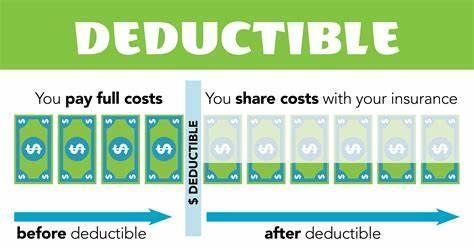Health insurance is an essential part of financial planning, but it can also be a significant expense. Fortunately, there are tax deductions available to help reduce the cost of health insurance. In this article, we will discuss the different types of health insurance deductions and how you can qualify for them.
There are two main types of health insurance deductions: above-the-line deductions and itemized deductions. Above-the-line deductions are subtracted from your gross income before you calculate your taxable income. Itemized deductions are subtracted from your taxable income after you calculate your gross income.
Above-the-Line Deductions
The following types of health insurance premiums are eligible for above-the-line deductions:
- Health insurance premiums for yourself, your spouse, and your dependents
- Long-term care insurance premiums
- Medical savings account (MSA) contributions
Itemized Deductions
If you itemize your deductions, you can deduct the following types of health insurance premiums:
- Health insurance premiums not eligible for above-the-line deductions
- Medical expenses that exceed 7.5% of your adjusted gross income (AGI)
To qualify for itemized deductions, your total medical expenses must exceed 7.5% of your AGI. This means that if your AGI is $50,000, you must have medical expenses of at least $3,750 to qualify for itemized deductions.
Is Health Insurance Tax Deductible?

Q: What types of health insurance premiums are eligible for above-the-line deductions?
A: The following types of health insurance premiums are eligible for above-the-line deductions:
- Health insurance premiums for yourself, your spouse, and your dependents
- Long-term care insurance premiums
- Medical savings account (MSA) contributions
Q: What types of health insurance premiums are eligible for itemized deductions?
A: If you itemize your deductions, you can deduct the following types of health insurance premiums:
- Health insurance premiums not eligible for above-the-line deductions
- Medical expenses that exceed 7.5% of your adjusted gross income (AGI)
Q: How do I qualify for itemized deductions?
A: To qualify for itemized deductions, your total medical expenses must exceed 7.5% of your AGI. This means that if your AGI is $50,000, you must have medical expenses of at least $3,750 to qualify for itemized deductions.
Q: What are some common medical expenses that I can deduct?
A: Some common medical expenses that you can deduct include:
- Doctor’s visits
- Hospital stays
- Prescription drugs
- Dental care
- Vision care
- Long-term care
Q: How do I claim my health insurance deduction?
A: To claim your health insurance deduction, you will need to complete Form 1040 and Schedule A. On Schedule A, you will list your medical expenses, including your health insurance premiums. You will then subtract your total medical expenses from your AGI to determine your itemized deductions.
Q: What if I have a high-deductible health plan (HDHP)?
A: If you have a HDHP, you may be eligible to contribute to a health savings account (HSA). HSAs are tax-advantaged accounts that can be used to pay for qualified medical expenses. Contributions to HSAs are tax-deductible, and withdrawals from HSAs are tax-free if used for qualified medical expenses.
Q: What if I receive health insurance through my employer?
A: If you receive health insurance through your employer, your employer will typically deduct the cost of your premiums from your paycheck. These premiums are not eligible for a tax deduction. However, you may be eligible for a tax deduction if you contribute to a flexible spending account (FSA) or a health reimbursement arrangement (HRA). FSAs and HRAs are employer-sponsored accounts that can be used to pay for qualified medical expenses. Contributions to FSAs and HRAs are tax-deductible, and withdrawals from FSAs and HRAs are tax-free if used for qualified medical expenses.
FAQ
Q: Is health insurance tax deductible?
A: Yes, health insurance premiums are tax deductible, but only if you itemize your deductions. To qualify for itemized deductions, your total medical expenses must exceed 7.5% of your adjusted gross income (AGI).
Q: What types of health insurance premiums are tax deductible?
A: The following types of health insurance premiums are tax deductible:
- Health insurance premiums for yourself, your spouse, and your dependents
- Long-term care insurance premiums
- Medical savings account (MSA) contributions
Q: How do I claim my health insurance deduction?
A: To claim your health insurance deduction, you will need to complete Form 1040 and Schedule A. On Schedule A, you will list your medical expenses, including your health insurance premiums. You will then subtract your total medical expenses from your AGI to determine your itemized deductions.
Q: What if I have a high-deductible health plan (HDHP)?
A: If you have a HDHP, you may be eligible to contribute to a health savings account (HSA). HSAs are tax-advantaged accounts that can be used to pay for qualified medical expenses. Contributions to HSAs are tax-deductible, and withdrawals from HSAs are tax-free if used for qualified medical expenses.
Q: What if I receive health insurance through my employer?
A: If you receive health insurance through your employer, your employer will typically deduct the cost of your premiums from your paycheck. These premiums are not eligible for a tax deduction. However, you may be eligible for a tax deduction if you contribute to a flexible spending account (FSA) or a health reimbursement arrangement (HRA). FSAs and HRAs are employer-sponsored accounts that can be used to pay for qualified medical expenses. Contributions to FSAs and HRAs are tax-deductible, and withdrawals from FSAs and HRAs are tax-free if used for qualified medical expenses.
Conclusion
Health insurance is an essential part of financial planning, but it can also be a significant expense. Fortunately, there are tax deductions available to help reduce the cost of health insurance. By understanding the different types of health insurance deductions and how to qualify for them, you can save money on your taxes and protect your health.
If you have any questions about health insurance deductions, please consult with a tax professional.
External Link
Invitation to Comment and Share
Please share your thoughts on health insurance deductions in the comments below. Have you ever claimed a health insurance deduction on your taxes? What tips would you give to others who are trying to save money on their health insurance costs?
